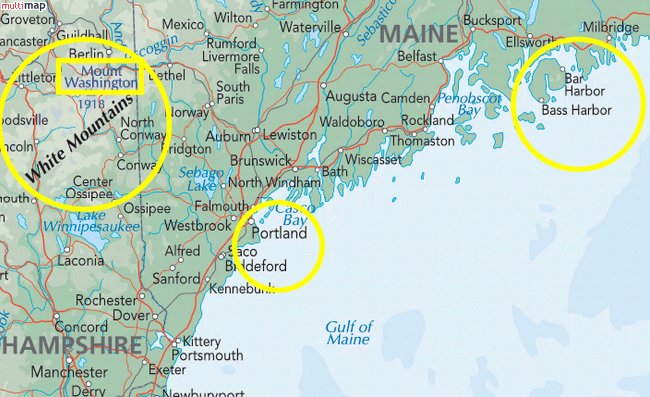 |
DAY THREE:
BAR HARBOR
AND
ACADIA
NATIONAL
PARK |
|
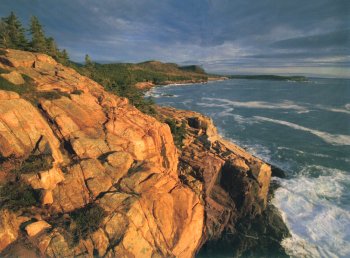 |
Day Three
brought us to Acadia, the most anticipated location on the trip.
Acadia National Park is
located in Maine on an island. This rock-bound area is known as Mount Desert
Island.
The geography of Acadia National Park ranges from soft meadows and
marshes to mountains covered with dense evergreen forests to huge
waves crashing against a rocky coastline.
Wherever you look, nature's beauty abounds. On every corner of
the island, the ocean makes its presence felt, whether by sight,
sound or smell. From the mountains above, you can see
glacier-carved valleys below with beautiful deep lakes. From
the sea, you can spot rugged granite cliffs side by side with sandy
cobblestone beaches.
Acadia is a paradise.
|
|
I had heard many wonderful things about
Acadia National Park,
but during my tour I was told that Acadia is the second most-visited park in the country.
I checked that out on Google and found it to be incorrect. So
here is a game for you:
Acadia ME
Big Bend TX
Grand Canyon AZ
Grand Teton WY Zion UT
Great Smoky Mountains TN, NC
Olympic WA
Rocky Mountain CO
Yellowstone ID,MT,WY
Yosemite CA
Which
of the ten parks listed is Number One?
Which of the ten parks listed above does not belong on this list?
And which of the 3 parks below did I delete to make room for the
bogus Top 10 park?
Cuyahoga Valley OH
Glacier MT
Haleakala HI
See answers to
Rick's Incredible Geography Quiz
|
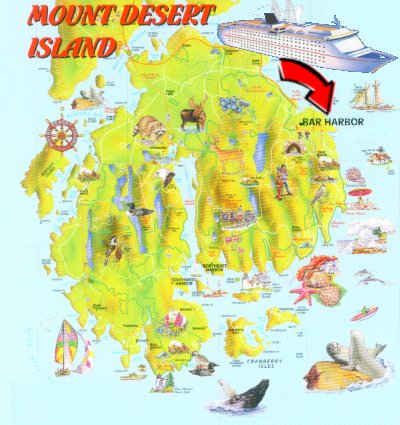 |
|
HISTORY OF
ACADIA
Acadia was a
sparsely-populated island that served mainly as a fishing base until
it was 'discovered' by the rich and famous during the 1800s.
It was the outsiders - artists
and journalists - who first popularized
this island to the world in the mid-1800's. Painters
such as Thomas Cole and Frederick Church
glorified Mount Desert Island with their brushstrokes.
They sold
their canvases to sponsors in Boston and New York. As
their wealthy patrons bought the
paintings, they exclaimed about the beauty of the landscape.
Once they discovered this beautiful area was more than just
a figment of the artist's imagination, they
invited friends to sail with them up the
coast and see the place for themselves. That is how
Acadia became the In Spot of the day.
Undaunted by crude accommodations and simple food,
the visitors sought out local
fishermen and farmers to put them up for a modest fee.
Summer after summer, they returned
to renew friendships with local islanders and, most of all
to savor the fresh salt air, beautiful scenery, and relaxed
pace.
Soon the villagers' cottages and fishermen's huts
were filled to overflowing.
By 1880 thirty hotels competed for vacationers'
dollars. Tourism was becoming the major industry
of the island, far surpassing the fishing.
For a select handful of Americans, the 1880s and the
"Gay Nineties" meant affluence on a scale without precedent.
Mount Desert Island, still
remote from the cities of the East, became a retreat for
prominent people of the times. The Rockefellers, Morgans,
Fords, Vanderbilts, Carnegies, and Astors, chose to spend
their summers here.
Not content with the simple lodgings
then available, these families transformed the landscape of
Mount Desert Island with elegant estates, euphemistically
called "cottages." Luxury, refinement and ostentatious
gatherings replaced buckboard rides, picnics, and day-long
hikes of an earlier era. For over 40 years, the wealthy held
sway at Mount Desert, but the Great Depression and World War
II marked the end of such extravagance.
The final blow came in 1947 when a fire of monumental
proportions consumed many of the
great estates. That put an end to
the Party Era once and for all. However, the days of
the wealthy people did not ruin the island. In fact,
these people took steps to insure its beauty would be
preserved. Though the affluent
had come here to frolic, they had
much to do with preserving the landscape that we know today.
From from this social strata
emerged George B. Dorr,
a tireless spokesman for conservation,
who devoted 43 years of his life, energy, and family
fortune to preserving the Acadian landscape.
In 1901, disturbed by the growing development of the Bar
Harbor area and the dangers he foresaw in the newly invented
gasoline powered portable sawmill, George Dorr and others
established the Hancock County Trustees of Public
Reservations. The sole purpose of this
corporation was to preserve land for the perpetual
use of the public. They had
acquired 6000 acres by 1913.
Dorr offered the land to the federal government.
In 1916, President Wilson announced the creation of
Sieur de Monts National Monument. Dorr
continued to acquire property and renewed his efforts to
obtain full national park status for his beloved preserve.
In 1919, President Wilson signed the act establishing
Lafayette National Park, the first national park east of the
Mississippi. Dorr, whose labors constituted "the greatest of
one-man shows in the history of land conservation" became
the first park superintendent.
In 1929, the park name changed to Acadia. Today the park
encompasses 35,000 acres, and the simple pleasures of
"ocean, forests, lakes, and mountains" that for over a
century and a quarter have been sought and found by
millions, are yours to enjoy.
|
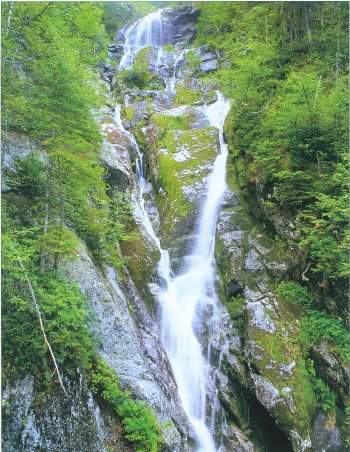
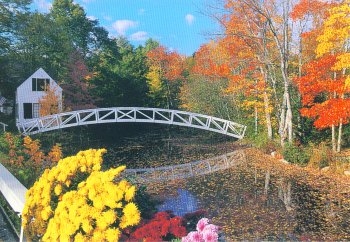
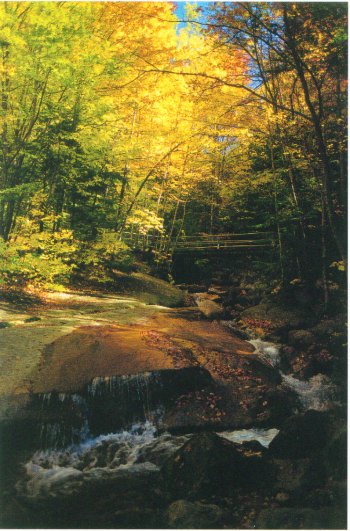 |
|
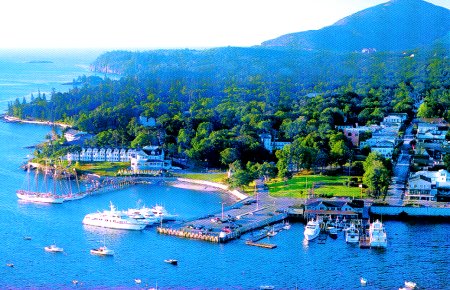 |
OUR DAY
IN BAR HARBOR AND ACADIA
Bar Harbor serves as the
gateway to Acadia National Park. The water is not deep enough to
allow the giant cruise ships to dock. Instead the ships have
to anchor about half a mile outside the harbor. Small
boats that double as lifeboats known as Tenders
shuttle the passengers back and forth.
Due to a great deal
of problems with the tender boats that ferried us to shore,
many of us did not get on the island till the afternoon.
Just in case you were curious, yes, we were very grouchy.
We'll talk about it later.
The area in the picture at the left is exactly where the tenders
dropped us off. The lovely city of Bar Harbor is very small
and within easy walking distance of the pier.
|
|
Marla and I spent the day with Cher Longoria and Robert
Goins. Our first order of business was to eat Authentic
New England Clam Chowder. Yum! I believe lobster cakes
came next. I made a big mistake saying 'no' to a
sampling of blueberry pie, another specialty of the area.
What was I thinking? I still can't imagine what came
over me. Marla glared at me for the rest of the day.
The four of us got a ride on Oli's Trolley. Our tour
guide was a 70 year old man named Bill who bore an amazing
resemblance to Clint Eastwood. Bill was a great guy.
He didn't have to read about Acadia History... he had
already lived through most of it. For example, there
was a catastrophic fire in 1947 that devastated almost the entire island.
Bill saw it first-hand and told us the details. He
said he had never been so scared in his life!
Bill was a walking encyclopedia of everything and anything
that happened on Acadia all the way back to the days of the
Revolutionary War. The way he talked, we assumed he
was there for that too.
Bill drove us
all around Acadia. The highlight of our trip was a
climb to the summit of Cadillac Mountain, the highest
mountain visible on the East Coast from the Atlantic Ocean.
The neat thing about Cadillac was the 360 degree view from
the top. You could see the whole island from up there.
We ran into
several other members of our group who were up on Cadillac
with other tours. As a result, we were able to snap a
great group picture way up high on top of the world.
Bill showed us a fabulous house that was the only large
estate to survive the terrible 1947 fire (pictured at right).
Now known as Highseas, it was built
in 1912 by Princeton professor Rudolph Brunnow as a wedding
present for his fiancée. He was a widower with several
children who needed a mother. The lovely young lady
who lived in England was filled with excitement as she
boarded her ship to sail to America for her wedding. Alas, she died on the maiden
voyage of the Titanic and never saw the
magnificent home.
Not long afterwards, Professor Brunnow
laid out the now famous
Precipice Trail near his house.
He fell while mountain climbing and was not found until the
following morning. He developed pneumonia and died at
his house. My
guess is this house is likely to be haunted for all the
tragedy it has seen.
There was so much to see in Acadia, but we only had about
three hours before we had to get back on the tenders.
It drove us crazy not to be to explore the many interesting trails
of an arboretum that Bill took us to. As we looked
around with what little time we had, we were disappointed to
note a near total absence of Fall color. So far
neither Boston, Martha's Vineyard, nor Acadia had much to
offer in the way of color. So much for the SSQQ
marketing slogan - Come see Nature's Paintbrush.
We inadvertently
stepped into a library that housed all kinds of maps and
pictures of the area. I really was interested in
seeing what was in there. However the lady at the desk said
it would be $2 to visit. We looked at each other and
shook our head. We only had 5 more minutes.
Another disappointment. This day was driving me crazy!
There is a legend of the Greek hero Odysseus where he wanted
to hear the music of the Sirens more than anything else in
the world. He knew there was a huge risk. Their song was so irresistible that any
sailor who heard it went mad with desire. The sailor would
be unable to resist bringing his boat closer to shore. However a sad fate awaited as every ship would wreck
upon on
the treacherous underwater reefs and the men who go to their
deaths. Odysseus
was undeterred. He filled the ears of each man with wax. Then he
had them tie him to a mast so he could hear the music, but
be helpless to do anything about it. As they passed
the Sirens, Odysseus screamed with madness at his inability
to get closer to the music.
As I left Acadia
National Park, my heart was heavy with the desire to see
more. This place was sheer magic, but I felt cheated.
Marla and I wanted to spend the day biking and hiking, but
we had so little time we had to settle for a bus trip. Now I knew exactly how Odysseus felt. I
had barely even touched this sacred ground and now I had to
leave.
The place didn't kill me, but I sure left in a
bad mood.
|
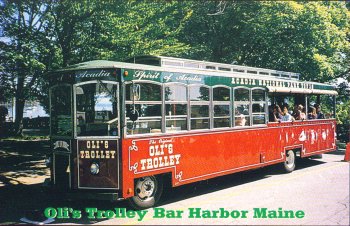

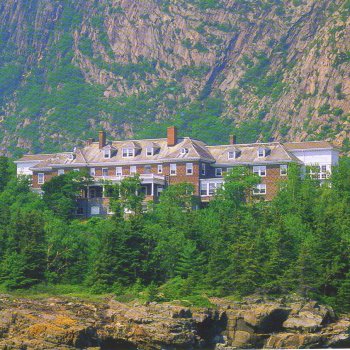
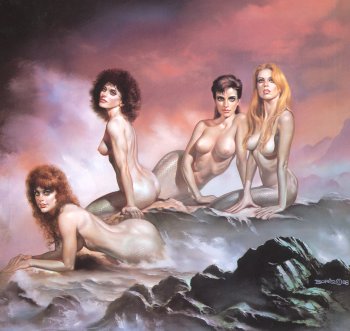 |
|
|
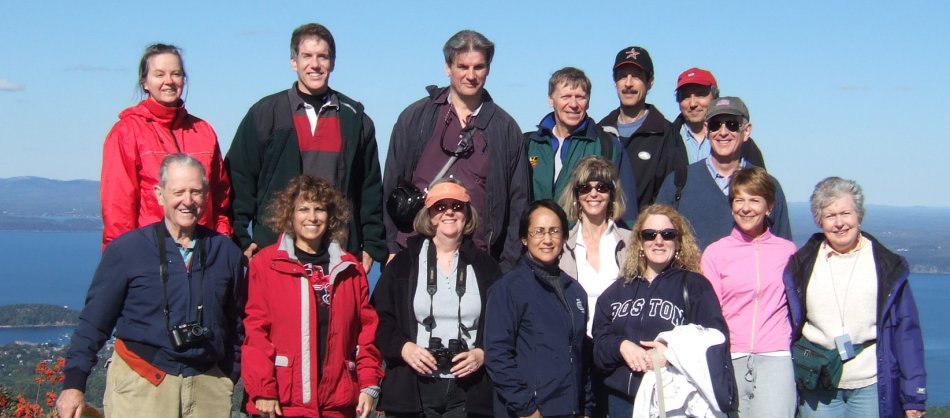
The Cadillac Mountain Crew
Top Row, Left to Right: Risa Pippen,
Robert Goins, Mike Maresh, Joe Pikas, Sol Eisenbaum , Dan
Bates, Jess Carnes
Bottom Row: George Keiller, Marla Archer, Judy Bates,
Rebecca Thayer, Cher Longoria, Donna Maresh, Leeane
Parkinson, Pat Carnes |
|
|
| |
| |
| |
Statistics for 2002 on Most-Visited
USA National Parks
- Great Smoky Mountains TN, NC
9,316,420
- Grand Canyon AZ 4,001,974
- Olympic WA 3,691,310
- Yosemite CA 3,361,867
- Cuyahoga Valley OH 3,217,935
- Rocky Mountain CO 2,988,475
- Yellowstone ID,MT,WY 2,973,677
- Grand Teton WY 2,612,629
- Zion UT 2,592,545
- Acadia ME 2,558,572
Guess what?
Big Bend, TX was not in Top
20, much less the Top 10. It is said to be a great
park, so my guess is that Big Bend is handicapped due to its
location at the bottom of Texas. I've never been
there. How about you?
11. Glacier MT
1,905,689
12. Mammoth Cave KY 1,891,307
13. Haleakala HI 1,521,080
14. Hot Springs AR 1,440,227
15. Shenandoah VA 1,389,244
16. Mount Rainer WA 1,310,390
17. Joshua Tree CA 1,178,376
18. Hawaii Volcanoes HI 1,110,998
19. Everglades FL 968,909
20. Sequoia CA 920,292
Back to Top of Page
|
Next
Page:
Halifax Nova Scotia
|